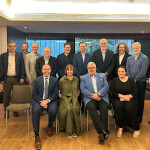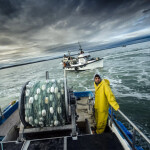Thailand has done enough to end forced labor on its fishing boats, a new report from the international human rights advocacy group Human Rights Watch claims.
Research for 134-page report, "Hidden Chains: Forced Labor and Rights Abuses in Thailand’s Fishing Industry", was conducted from 2015 to 2017 in all major Thai fishing ports. The NGO interviewed 248 current and former workers in the fishing industry, .including 95 whom Thai authorities or others had designated as victims of trafficking, about recruitment practices, salaries and payment systems, working hours, occupational health and safety, and a range of other issues they experienced on-board Thai fishing vessels.
The report, a follow-up to widely read 2014 Guardian and Associated Press stories that detailed labor abuses in the Thai seafood sector, identified poor working conditions, recruitment processes, terms of employment, and industry practices “that put already vulnerable migrant workers into abusive situations – and often keep them there.”
While Thailand’s government has significantly overhauled fishing industry monitoring, control, and management regimes in recent years, labor problems persist in the country’s seafood industry, the report said.
“Forced labor in the Thai fishing industry has persisted amid a culture of abuse, even as the government has undertaken high-profile initiatives to clean up the sector and portray a better image internationally,” the NGO said in the report. “Despite some improvements, the situation has not changed substantially since a large-scale survey of 496 fishers in 2012 found that almost one in five ‘reported working against their will with the menace of a penalty preventing them from leaving.’”
Thailand’s reforms include the establishment of new interagency inspection frameworks; the inspection of fishing boats each time they enter and leave port; strengthened laws and penalties for infringing on fishers’ rights; and numerous others.
“Yet they have had little effect on human rights abuses that workers face at the hands of ship owners, senior crew, brokers, and police officers,” HRW said in its report. “Meanwhile, the impact of stronger regulatory controls on improving conditions of work at sea has been limited as a result of poor implementation and enforcement.”
Among the numerous recommendations HRW puts forward at the end of its report, it calls for forced labor to be made a stand-alone offense under Thai law.
“Without legal provisions criminalizing the practices that put individuals who have voluntarily begun work in the fishing sector into situations of forced labor, victims have little hope of accessing appropriate remedies or seeing perpetrators held to account,” HRW said in its report.
In response to the report, Thailand’s Ministry of Foreign Affairs released a detailed rebuttal.
“The Royal Thai Government has…put a great effort into solving labor problems in the fishing industry. The government has implemented various legal reforms, policies, and strengthened law enforcement on labor protection as well as engaged closely with the private sector, non-governmental organizations and neighboring countries,” the ministry’s statement said. “As a result, there has been significant improvement in the labor situation in the fishing industry in many areas. Disappointedly, the Report of HRW contains many outdated references caused by using information from the situation in 2016 and in some cases, dating back to 2012. This shows that there has been no update of the latest status of this issue, and, therefore, the report does not take into consideration the current progress and efforts made by Thailand in solving labor problems.”
Thailand is in the process of enacting several of the HRW’s recommendations, according to the statement.
“Thailand is in the process of drafting the “Prevention and Elimination of Forced Labour Act” to be in compliance with the Protocol to the Forced Labour Convention (P29), and the work in fishing law in line with the Work in Fishing Convention (C188). It is anticipated that the drafting process will be complete in late March 2018, thus enabling Thailand to be ready for the ratification by June 2018,” the statement said. “Regarding the Right to Organize and Collective Bargaining Convention 98 (C98), an amendment to the domestic legislation is underway and is expected to be completed in September 2018 before the ratification process.”
Thailand has admitted and continues to acknowledge its shortcomings on labor issues and has vowed to continue to address them, the Ministry of Foreign Affairs said.
“The Royal Thai Government categorically denies the HRW’s accusation that Thailand has tried to ‘white-wash’ this problem. This cannot be further from the truth,” it said. “The Royal Thai Government urges the HRW to take a balance[d] view of the current labor situation in Thailand without prejudice.”






